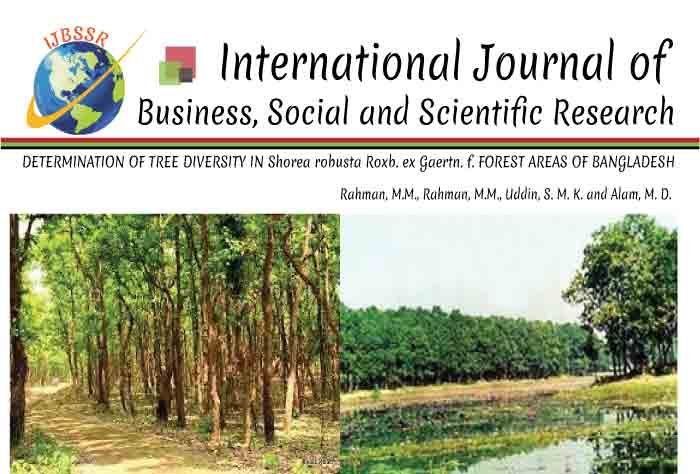DETERMINATION OF TREE DIVERSITY IN Sal (Shorea robusta) FOREST AREAS OF BANGLADESH

The tropical moist deciduous forest is the most important natural
resource of Bangladesh and is rich in biodiversity. Shorea
robusta Roxb. ex Gaertn. f. is the dominant tree species in moist
deciduous forest areas. Shorea robusta
forest areas are the most important for ecological balance in the central and
northern parts of Bangladesh. Moist deciduous forest areas are declining at an
alarming rate due to anthropogenic activities. The main aim of the study was to
determine the present status of the tree species in the Shorea robusta forest areas of Bangladesh. A systematic sampling
using Global Positioning Systems was followed for the selection of plots. The
present study revealed that a total of 102 tree species of 68 genera under 37
families were recorded in the study areas. The dominant families with respect
to species number were Euphorbiaceae (11), Moraceae (10), Mimosaceae (7),
Meliaceae (5), Myrtaceae (5) Caesalpiniaceae (4), Dipterocarpaceae (2), and 13
families were represented by two species and 17 families were represented by a
single species. The present study also indicated that a total of 13 types of
fruit were found and the drupe type of fruit was dominant and possessed 25.50 %
in the study areas. The contribution of
the samara type of fruit was only 0.98% and the lowest in the Shorea robusta forest areas.
Determination of the actual tree species is essential for proper management and
sustainable development of the Shorea
robusta forest areas. The findings of the present investigation will be
helpful for the protection, sustainable management and conservation of tree
species in the Shorea robusta forest
areas of Bangladesh.

